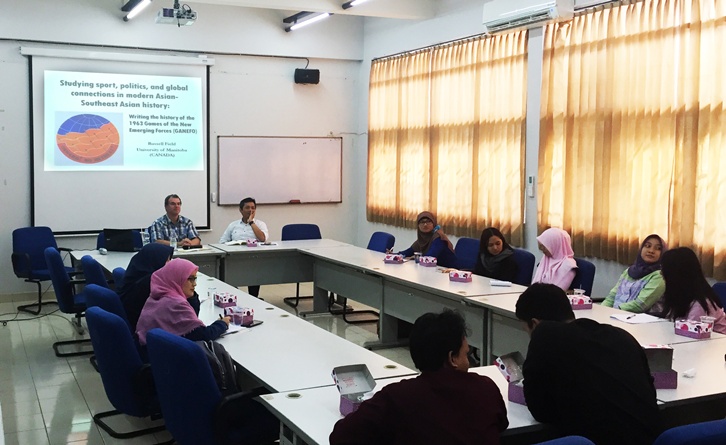
Dr. Russell Field, on Friday (10/2/2017) had the opportunity to attend a public lecture in Meeting Room I, Poerbatjaraka Building, Faculty of Cultural Sciences UGM. A research assistant from the University of Manitoba Canada, he gave a public lecture with the theme “Studying Sport, Politics, and Global Connection”. The event was organized by the Department of History, Faculty of Cultural Sciences UGM. The public lecture was the first schedule of two planned public lectures with a discussion of sports and history.
Dr. Russell talked about sports relations and global political developments in 1963. He departed from his research on the Games Of New Emerging Force (Ganefo). The sporting event was held in Jakarta in 1963 at the initiative of the then President of Indonesia, Soekarno. although Russell Field doesn’t go into detail about Ganefo. He focused the discussion on sport as a subject of historical research.
Throughout the public lectures, the importance of choosing a topic in research is always emphasized. A researcher must find the advantages of the topic to get an initial knowledge. In Ganefo’s case, why is it important? First, Ganefo is a multinational sporting party that represents the spirit of the ‘new countries’ (Emerging Forces) who are actively pursuing decolonization. Second, Ganefo was attended by nearly 3000 athletes from 51 different countries. Indonesia became the country with the largest contingent, followed by China and the Soviet Union.
Armed with these advantages Ganefo can become an important research topic. According to Russell, Ganefo can be explored as a sporting event and its relation to global politics. On the other hand, Ganefo can be a reflection of society in his day. This can be obtained from an effort to explore the experience of the community when the sports party was held. Is it important to society? Jakarta in particular? Furthermore, Russell said, to support this, researchers must have an analytical framework (theoretical framework) how he views the research topic and processes it.
Russell’s research actually uses methodologies, ways of working, and approaches that are rarely used by Indonesian researchers. In looking at Ganefo he uses the Global History approach, which shows more of a global network. That what is happening in Indonesia –Ganefo- cannot be separated from the network and what is happening in the global sphere. Lecture with Dr. Russell plans to be held twice. The next meeting will be held on Monday (13/2/2017) in the UGM Multimedia Room, at 13.00 WIB. (Sej/Bagus)
